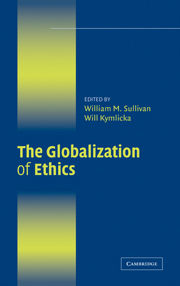Book contents
- Frontmatter
- Contents
- Contributors
- Acknowledgments
- 1 Introduction: The Globalization of Ethics
- 2 Global Ethics and the International Law Tradition
- 3 Morality and Universality in Jewish Thought
- 4 Globalization and Christian Ethics
- 5 Buddhism and the Globalization of Ethics
- 6 Muslim Perspectives on Global Ethics
- 7 Confucianism: Ethical Uniformity and Diversity
- 8 Natural Law, Common Morality, and Particularity
- 9 Liberalism and the Globalization of Ethics
- 10 Feminist Perspectives on a Planetary Ethic
- 11 Ethical Universalism and Particularism: A Comparison of Outlooks
- Appendix: Key Documents on Global Ethics
- A Universal Declaration of Human Rights
- B International Covenant on Civil and Political Rights
- C International Covenant on Social, Economic and Cultural Rights
- D Declaration Toward a Global Ethic
- E Universal Islamic Declaration of Human Rights
- F Cairo Declaration on Human Rights in Islam
- G The Bangkok Declaration
- H Asian Human Rights Charter: A People's Charter
- Bibliography
- Index
F - Cairo Declaration on Human Rights in Islam
Published online by Cambridge University Press: 03 September 2009
- Frontmatter
- Contents
- Contributors
- Acknowledgments
- 1 Introduction: The Globalization of Ethics
- 2 Global Ethics and the International Law Tradition
- 3 Morality and Universality in Jewish Thought
- 4 Globalization and Christian Ethics
- 5 Buddhism and the Globalization of Ethics
- 6 Muslim Perspectives on Global Ethics
- 7 Confucianism: Ethical Uniformity and Diversity
- 8 Natural Law, Common Morality, and Particularity
- 9 Liberalism and the Globalization of Ethics
- 10 Feminist Perspectives on a Planetary Ethic
- 11 Ethical Universalism and Particularism: A Comparison of Outlooks
- Appendix: Key Documents on Global Ethics
- A Universal Declaration of Human Rights
- B International Covenant on Civil and Political Rights
- C International Covenant on Social, Economic and Cultural Rights
- D Declaration Toward a Global Ethic
- E Universal Islamic Declaration of Human Rights
- F Cairo Declaration on Human Rights in Islam
- G The Bangkok Declaration
- H Asian Human Rights Charter: A People's Charter
- Bibliography
- Index
Summary
Adopted at the Nineteenth Islamic Conference of Foreign Ministers, Cairo, August 5, 1990.
The Member States of the Organization of the Islamic Conference,
Reaffirming the civilizing and historical role of the Islamic Ummah which God made the best nation that has given mankind a universal and well-balanced civilization in which harmony is established between this life and the hereafter and knowledge is combined with faith; and the role that this Ummah should play to guide a humanity confused by competing trends and ideologies and to provide solutions to the chronic problems of this materialistic civilization;
Wishing to contribute to the efforts of mankind to assert human rights, to protect man from exploitation and persecution, and to affirm his freedom and right to a dignified life in accordance with the Islamic Shari'ah;
Convinced that mankind which has reached an advanced stage in materialistic science is still, and shall remain, in dire need of faith to support its civilization and of a self-motivating force to guard its rights;
Believing that fundamental rights and universal freedoms in Islam are an integral part of the Islamic religion and that no one as a matter of principle has the right to suspend them in whole or in part or violate or ignore them in as much as they are binding divine commandments, which are contained in the Revealed Books of God and were sent through the last of His Prophets to complete the preceding divine messages thereby making their observance an act of worship and their neglect or violation an abominable sin, and accordingly every person is individually responsible – and the Ummah collectively responsible – for their safeguard.
- Type
- Chapter
- Information
- The Globalization of EthicsReligious and Secular Perspectives, pp. 257 - 262Publisher: Cambridge University PressPrint publication year: 2007

